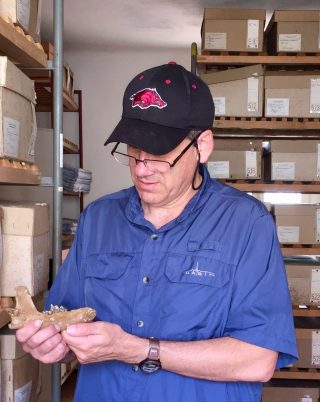The 2017 summer season of Field Notes is underway with researchers from music and physics to anthropology and biological sciences headed across the globe to further their research.
Peter Ungar, Distinguished Professor of anthropology and director of the Environmental Dynamics Program at the University of Arkansas, has begun his field work season in the Czech Republic, where he’s working with a team of researchers on a project close to many people’s hearts – the domesticated dog.
 Ungar is working with an international team to look into when dogs were domesticated. He and his colleagues are poring over the extensive canid fossils in the storerooms of the Castle of Budisov outside of Brno, Czech Republic, home to the natural history fossil collections of the Monrovian Museum.
Ungar is working with an international team to look into when dogs were domesticated. He and his colleagues are poring over the extensive canid fossils in the storerooms of the Castle of Budisov outside of Brno, Czech Republic, home to the natural history fossil collections of the Monrovian Museum.
Peter explains:
“I am…studying what may be among the oldest known “dogs” (26,000 – 27,000 years) to understand the process of domestication,” he wrote in an email last week. “There’s this huge debate as to whether dogs were domesticated during the Ice Age, as far back as 36,000 years ago, or around the time of the origins of agriculture, around 12,000 years ago. The field is divided, and there’s little consensus based on either the genetics or the anatomy. The canids from Předmostí date to the Ice Age, and some researchers believe there are two distinct forms from the site, one representing wolves in the other dogs. Our idea is that if there really are both, they should have different diets distinguishable by dental microwear.”
Ungar is a paleoanthropologist nationally known for his work analyzing microwear on fossilized teeth to glean information about ancient diets and environments through tooth shape and patterns of wear.
He is author or co-author of more than 165 scientific papers and author of the newly released book, Evolution’s Bite: A Story of Teeth, Diet and Human Origins, as well as Teeth: A Very Short Introduction and Mammal Teeth: Origin, Evolution, and Diversity and the editor of Evolution of the Human Diet: The Known, the Unknown, and the Unknowable.
Listen to an excerpt of Evolution’s Bite here, or on our podcast, Short Talks from the Hill.






You must be logged in to post a comment.